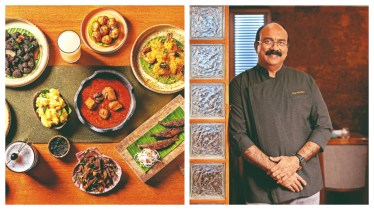Kerala’s rich and diverse culinary heritage is making its way to the global stage.At the forefront of this movement is Chef Regi Mathew, who recently opened his new restaurant, Chatti, in New York inspired by the south Indian state’s toddy shop culture. With years of research, including visits to over 100 toddy shops, Mathew is bringing the essence of Kerala’s communal dining, bold flavours, and traditional cooking methods to one of the world’s most dynamic food cities.
Mathew, who is also the partner and co-founder of Kappa Chakka Kandhari (Bengaluru and Chennai), talks about what inspired him to open Chatti in New York, the significance of its name, the philosophy behind his cocktail menu, and his vision for Kerala cuisine on the international stage, among others, in an interview with FE. Edited excerpts:
Chatti is your first international venture. What inspired you to launch the restaurant in New York, and why did you choose that city? What kind of research went into it?
I chose New York because it is a multicultural hub with a vibrant dining scene. It provides the perfect setting to introduce Kerala’s toddy shop cuisine to a global audience. I have researched my cuisine for over three years, visiting around 100 toddy shops across Kerala. Many people are unaware of the diversity within our regional cuisines. Given the depth and richness of Kerala’s culinary heritage, I am incredibly proud to present it to the world. New York is the ideal place to bring my toddy shop concept to life.
What is the significance of the name ‘Chatti’, and how does it reflect Kerala’s culinary heritage?
The name ‘Chatti’ (pronounced chuht-tee) refers to the traditional clay pot central to Kerala’s toddy shops and homes. These clay pots enhance the flavours of the dishes as they allow the food to mature over time. In toddy shops, food is typically prepared in the morning and left to develop its taste in chattis before being served to guests. This cooking method is an essential part of Kerala’s culinary tradition.
How is your restaurant in India, Kappa Chakka Kandhari, different from Chatti?
The philosophies behind both restaurants are different. Chatti is rooted in the toddy shop food culture, while Kappa Chakka Kandhari is inspired by the home-cooked meals from mothers’ kitchens. However, both restaurants celebrate Kerala cuisine at their core.
What inspired your cocktail menu?
The inspirations for my cocktails come from the landscapes of Kerala. The flavours, ingredients, and techniques used in the cocktails reflect the essence of the region, creating a unique drinking experience.
Indian food is often generalised internationally. How do you plan to make Kerala cuisine stand out?
For many people, Indian cuisine is limited to a few well-known dishes. I want to showcase the depth of our culinary heritage, including our regional, sub-regional, and micro-level cuisines. People need to understand the culinary wealth India has. When you really get into the regional cuisine, you will also get to know the regional wealth we have.
The richness of Indian food culture has given me the confidence to introduce a Kerala-focused restaurant brand in a market like New York.
Many chefs tone down flavours to suit Western palates. Why did you decide to stay true to Kerala’s bold flavours?
I believe in doing justice to the cuisine. For me, spiciness is about flavour, not just pungency. Our cooking style ensures depth of taste without overwhelming heat. Even here in New York, we use slow cooking methods to preserve authenticity, just as we do in Kerala.
How do you ensure that your ingredients—such as spices-maintain their authenticity in the foreign market?
We source all our spices directly from India. I have specific spices that I always use while cooking, and I will continue to do the same here to maintain the integrity of our flavours.
Are you targeting New York’s large Indian diaspora, or is your focus on a broader global audience?
People today are well-travelled and have a deep appreciation for diverse cuisines. While the Indian diaspora here takes pride in their culinary heritage and introduces local friends to our food, my goal is to appeal to a global audience.
Do you have plans to expand Kappa Chakka Kandhari to other parts of India? What about Chatti?
I take on one project at a time, ensuring that each concept is well-established before moving on to the next. Simply opening restaurants is not my approach; I spend ample time refining each venture to ensure its success. Expansion for both Kappa Chakka Kandhari and Chatti will take time and careful planning.
